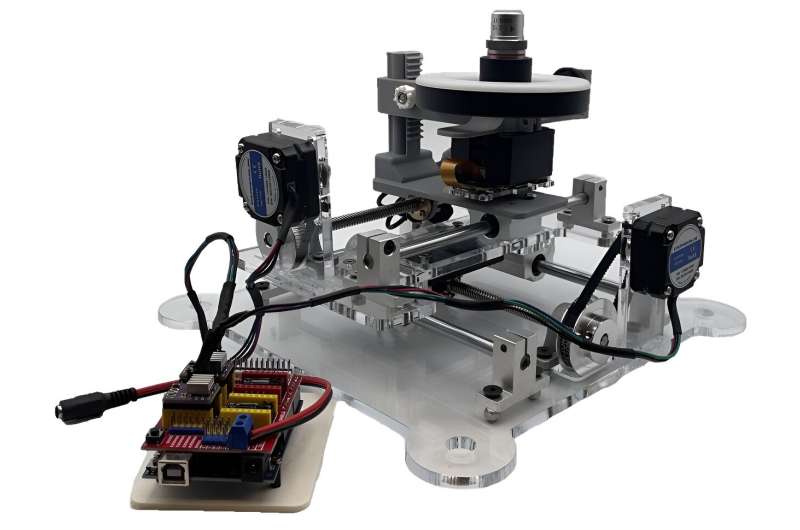This article has been reviewed according to Science X's editorial process and policies. Editors have highlighted the following attributes while ensuring the content's credibility:
fact-checked
peer-reviewed publication
trusted source
proofread
An affordable tracking microscope to democratize microorganism research

Studying the complex motility patterns of cells and microorganisms is key to understanding their behaviors and biomechanics. However, many conventional microscopes are constrained by fixed lenses and the lack of ability to track organisms over extended periods without manual intervention.
But researchers at the Georgia Institute of Technology have overcome these limitations through the development of an inexpensive, easy-to-assemble, modular, autonomous tracking microscope.
At a cost of $400 in parts with DIY assembly instructions available, Trackoscope is a frugal-science innovation accessible to a wide range of users, from high school laboratories to resource-constrained research environments.
Developed in the laboratory of Saad Bhamla, associate professor in Georgia Tech's School of Chemical and Biomolecular Engineering (ChBE), the Trackoscope is described in a new paper published in the journal PLOS ONE
The lead author of the paper is mechanical engineering major Priya Soneji, an undergraduate researcher working in the Bhamla Lab. Now a Georgia Tech senior, she first had the idea for the Trackoscope in 2019 while still a student at Milton High School near Atlanta.
"I was frustrated that I had to keep moving around the slide to see organisms under the microscope, and I figured there could be a way to automate that since I'd been working with robotics since third grade," Soneji said.
Then, she learned of the wide range of frugal-science innovations emerging from the Bhamla Lab, so she reached out to begin the project while finishing her high school studies. "I pitched him the project, and he was immediately on board."
In addition to Bhamla, Soneji's research mentors include paper co-author Elio Challita (Bioengineering Ph.D. 2023), who is now a postdoctoral researcher at Harvard University.
Capturing diverse behaviors
Soneji's original concept evolved into a versatile microscope capable of monitoring organisms across velocities ranging from 0.1 µm/s to 2 mm/s within a vast tracking area of 325 cm2. This expansive view minimizes the risk of organisms colliding with container walls, preserving their natural behaviors and enabling experiments involving predator-prey dynamics.
"Utilizing Trackoscope, we captured a diverse array of behaviors, from the air-water swimming locomotion of amoeba to bacterial hunting dynamics in actinosphaerium, walking gait in tardigrada, and binary fission in motile blepharisma," Challita said.
"With Trackoscope, any scientist will be able to gain new insights into the microbial world."
Frugal science solution
Compared to the $400 Trackoscope, existing tracking solutions can cost from $1,000 to $5,000, putting them out of the reach of researchers in resource-constrained environments.
The modular design of Trackoscope facilitates customization and adaptation to specific research needs. Its construction involves straightforward assembly using materials like wood or acrylic, plus laser-cut and 3D-printed components.
"We want labs to be able to easily build this and use it," Soneji said.
Trackoscope's optical module includes key components such as a Raspberry Pi High-Quality Camera with a 12.3 MP Sony IMX477 sensor and an achromatic doublet lens. This setup allows for a versatile range of magnifications from 20X to 200X, enabling precise observation of microorganisms across various speeds.
Trackoscope employs motorized XY stage controls, but the researchers have developed prototypes with enhanced control mechanisms, such as motorized Z-axis adjustments.
"These innovations underscore Trackoscope's adaptability and potential for future enhancements in microorganism research and STEM education," Bhamla said.
More information: Priya Soneji et al, Trackoscope: A low-cost, open, autonomous tracking microscope for long-term observations of microscale organisms, PLOS ONE (2024). DOI: 10.1371/journal.pone.0306700
Journal information: PLoS ONE
Provided by Georgia Institute of Technology




















